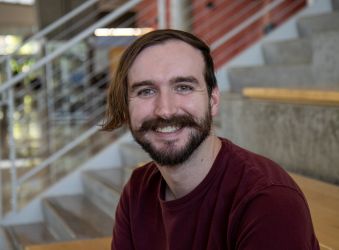Dedicated to inventing the future of the humanities, Texts and Technology is an interdisciplinary doctoral program that integrates fields such as writing, rhetoric, philosophy, technical communication, and public history with digital methods and practices in coding, game design, and archiving. The program supports engagement with digital practices in dialectical, rhetorical, procedural, and critical-cultural fields. The T&T program considers literacy in a broad sense, from traditional notions of writing and communication to more contemporary notions of computational and procedural literacy (e.g., using programming and new media installations as inventive methods for production, critique, and analysis).
Since 2001, UCF’s Texts and Technology doctoral program has excelled in supporting its students with an internationally recognized faculty and by offering a rigorous curriculum in a friendly environment. Students bring knowledge of a specific discipline and deepen their understanding of the subject through a digital lens. In the T&T program, students adapt, develop, assess, and invent information practices in relation to emergent information technologies in and beyond the humanities.
What is Texts & Technology?
This question arises inevitably when the name of our doctoral program crosses people’s monitors or appears on a CV: unlike the disciplines entrenched in the academy’s history, “Texts & Technology” is a provocation, an invitation to work outside those disciplines and confront challenges that demand an understanding of the layers of the systems that are shaping our world. From the interface and operational layers of the operating systems we take for granted until confronted with a blue screen; to the video games and casual games that fill the spaces in our daily lives and commutes; to the social media networks where friendships and ideologies are forged and broken; these systems demand new ways of seeing.
When Texts & Technology was founded in 2001, it was part of an early move towards transdisciplinary thinking driven by increased disruption of humanities workflows and methods by technology. In 2011, Ian Bogost offered his commentary on the challenge of defining the digital humanities, suggesting that “despite constant critical theoretical incantations about futurity and deferral and uncertainty and politics, the humanities are finally discovering that they ought to care about the present and the future.” Not yet another decade later, it is similarly still challenging to define the scope of Texts & Technology, a transdisciplinary discourse that encompasses a range of potential specializations and asks students to wrestle with questions and platforms that are constantly changing: in short, to care about the present and the future. Academic communities are increasingly recognizing the need to collapse the silos of traditional disciplines and infuse humanities values and methods of critical inquiry into our approach to technology. Texts & Technology provides students with the tools to drive these changes.
Students in Texts & Technology are both scholars and makers. They engage with texts that include code, images and image-text, databases, and languages, and in doing so advance the present (and future) of humanist inquiry.
Anastasia Salter
Director
Texts and Technology is a rigorous interdisciplinary doctoral program that trains students to critique, invent, and apply information practices in relation to emergent media in and beyond the humanities.
Integrating fields such as writing, rhetoric, philosophy, technical communication, and history with digital methods and practices in coding, gaming, and archiving, the Texts and Technology Ph.D. program supports engagement with digital practices in the dialectical, rhetorical, procedural, and critical-cultural fields. Furthermore, students engage with the political, social, and philosophical dimensions of this work, dealing with gender, race, power, ethics, and related concerns.
Graduates have developed rich knowledge of the practices, applications, history and theories of information practices and are trained to conduct primary research related to a broad range of topics. Diverse student projects have focused on textuality, visuality, the arts, science communication, history, city planning, forensics, community activism, mapping, memory, universal access, medical rhetoric, gaming, folklore, food, and war.
Increase your employability
78% of recent graduates work in universities, 12% in industry, 6% in K-12 education, and 3% in government.
Interdisciplinary options
This is an interdisciplinary program that will appeal to students with interests in social media, fan studies, rhetoric, the environment, ethics, communication, history, gender, race, the arts, curating, games, activism, education, coding, narrative, film, postcolonialism, queer studies, and critical making (to name a few!). For those who have interests in multiple areas, T&T is designed to facilitate customized studies. You will meet scholars and students from a variety of disciplines and backgrounds.
Best of both worlds
The small program is fueled by the resources of a large research university.
Flexible schedule
The choice of a full-time or part-time schedule is yours. A full time student can finish in approximately four years.
The price is right
UCF has been recognized by Forbes, The Princeton Review and Kiplinger’s for being one of the most affordable and best-value universities in the U.S.
In-state tuition and fees for the Texts and Technology program total $21,070.
Assistantships and fellowships are available.
- We admit a new class of 12-15 students each fall.
- Students currently in the program hail from fifteen different states and four countries outside of the USA
- Students choose either a full time or part time schedule.
- Many students take advantage of financial assistance from the university such as fellowships, scholarships, or graduate assistantships.
- Thirty UCF faculty from across the College of Arts & Humanities including Writing and Rhetoric, English, Philosophy, Art, Theatre, and History
- The program has dozens of graduate faculty scholars representing institutions throughout the United States and globally who serve on dissertation committees
- The T&T program is also supported by the UCF Center for Humanities & Digital Research
Texts and Technology is a great program for interdisciplinary and transdisciplinary scholarship. It encourages students to draw on areas outside their immediate field to build unique perspectives. ”

